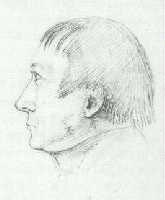[Previous] [Next] [Up] [Top] [Index]
Georg Wilhelm Friedrich Hegel
(1770-1831)
 German philosopher. Born at Stuttgart, Hegel studied at Tübingen,
where his contemporaries included Schelling and the poet Hölderlin.
After holding positions as a tutor he went to Jena in 1801 as a
Privatdozent in philosophy. While in Jena he collaborated with
Schelling in editing the Kritisches Journal der Philosophie,
to which he contributed many articles. Promoted to a chair in 1805, he
then was forced to leave Jena because of the Napoleonic war, became
editor of a newspaper, and from 1807 spent eight years as director of
the Gymnasium in Nürnberg. In 1816 he became professor of philosophy
at Heidelberg. Two years later he succeeded Fichte as a professor
in Berlin and entered into his most famous and influential period.
Hegel attracted great numbers of foreign students to Berlin, and had
an unparalleled influence on German philosophy in the 19th century.
He was also the central philosophical influence on Marx and Engels, and
on English philosophy in the absolute idealist phrase, and although his
reputation in the Anglo-American world has suffered periods of eclipse,
he continues to be a focal point for many thinkers.
German philosopher. Born at Stuttgart, Hegel studied at Tübingen,
where his contemporaries included Schelling and the poet Hölderlin.
After holding positions as a tutor he went to Jena in 1801 as a
Privatdozent in philosophy. While in Jena he collaborated with
Schelling in editing the Kritisches Journal der Philosophie,
to which he contributed many articles. Promoted to a chair in 1805, he
then was forced to leave Jena because of the Napoleonic war, became
editor of a newspaper, and from 1807 spent eight years as director of
the Gymnasium in Nürnberg. In 1816 he became professor of philosophy
at Heidelberg. Two years later he succeeded Fichte as a professor
in Berlin and entered into his most famous and influential period.
Hegel attracted great numbers of foreign students to Berlin, and had
an unparalleled influence on German philosophy in the 19th century.
He was also the central philosophical influence on Marx and Engels, and
on English philosophy in the absolute idealist phrase, and although his
reputation in the Anglo-American world has suffered periods of eclipse,
he continues to be a focal point for many thinkers.
A voluminous literature on Hegel and Hegelian thought exists in
English, including biographical studies, translations, and
commentaries on his writings.
[Previous] [Next] [Up] [Top] [Index]
|
|

|